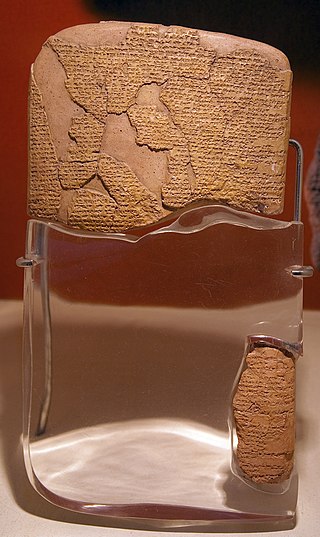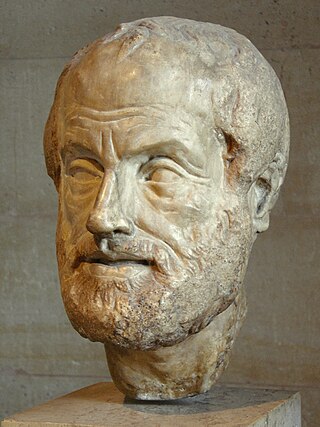In classical logic, disjunctive syllogism is a valid argument form which is a syllogism having a disjunctive statement for one of its premises.
The propositional calculus is a branch of logic. It is also called (first-order) propositional logic, statement logic, sentential calculus, sentential logic, or sometimes zeroth-order logic. It deals with propositions and relations between propositions, including the construction of arguments based on them. Compound propositions are formed by connecting propositions by logical connectives representing the truth functions of conjunction, disjunction, implication, biconditional, and negation. Some sources include other connectives, as in the table below.
In propositional logic, modus ponens, also known as modus ponendo ponens, implication elimination, or affirming the antecedent, is a deductive argument form and rule of inference. It can be summarized as "P implies Q.P is true. Therefore, Q must also be true."
In propositional logic, modus tollens (MT), also known as modus tollendo tollens and denying the consequent, is a deductive argument form and a rule of inference. Modus tollens is a mixed hypothetical syllogism that takes the form of "If P, then Q. Not Q. Therefore, not P." It is an application of the general truth that if a statement is true, then so is its contrapositive. The form shows that inference from P implies Q to the negation of Q implies the negation of P is a valid argument.

The Principia Mathematica is a three-volume work on the foundations of mathematics written by the mathematician–philosophers Alfred North Whitehead and Bertrand Russell and published in 1910, 1912, and 1913. In 1925–1927, it appeared in a second edition with an important Introduction to the Second Edition, an Appendix A that replaced ✱9 with a new Appendix B and Appendix C. PM was conceived as a sequel to Russell's 1903 The Principles of Mathematics, but as PM states, this became an unworkable suggestion for practical and philosophical reasons: "The present work was originally intended by us to be comprised in a second volume of Principles of Mathematics... But as we advanced, it became increasingly evident that the subject is a very much larger one than we had supposed; moreover on many fundamental questions which had been left obscure and doubtful in the former work, we have now arrived at what we believe to be satisfactory solutions."

A treaty is a formal, legally binding written agreement concluded by sovereign states in international law. International organizations can also be party to an international treaty. A treaty is binding under international law.
Sui generis is a Latin phrase that means "of its/their own kind" or "in a class by itself", therefore "unique".

A fact is a true datum about one or more aspects of a circumstance. Standard reference works are often used to check facts. Scientific facts are verified by repeatable careful observation or measurement by experiments or other means.
Deductive reasoning is the process of drawing valid inferences. An inference is valid if its conclusion follows logically from its premises, meaning that it is impossible for the premises to be true and the conclusion to be false. For example, the inference from the premises "all men are mortal" and "Socrates is a man" to the conclusion "Socrates is mortal" is deductively valid. An argument is sound if it is valid and all its premises are true. One approach defines deduction in terms of the intentions of the author: they have to intend for the premises to offer deductive support to the conclusion. With the help of this modification, it is possible to distinguish valid from invalid deductive reasoning: it is invalid if the author's belief about the deductive support is false, but even invalid deductive reasoning is a form of deductive reasoning.

An armistice is a formal agreement of warring parties to stop fighting. It is not necessarily the end of a war, as it may constitute only a cessation of hostilities while an attempt is made to negotiate a lasting peace. It is derived from the Latin arma, meaning "arms" and -stitium, meaning "a stopping".
"What the Tortoise Said to Achilles", written by Lewis Carroll in 1895 for the philosophical journal Mind, is a brief allegorical dialogue on the foundations of logic. The title alludes to one of Zeno's paradoxes of motion, in which Achilles could never overtake the tortoise in a race. In Carroll's dialogue, the tortoise challenges Achilles to use the force of logic to make him accept the conclusion of a simple deductive argument. Ultimately, Achilles fails, because the clever tortoise leads him into an infinite regression.
A modus operandi is an individual's habits of working, particularly in the context of business or criminal investigations, but also generally. It is a Latin phrase, approximately translated as 'mode of operating'.

The Organon is the standard collection of Aristotle's six works on logical analysis and dialectic. The name Organon was given by Aristotle's followers, the Peripatetics, who maintained against the Stoics that Logic was "an instrument" of Philosophy.
Backward chaining is an inference method described colloquially as working backward from the goal. It is used in automated theorem provers, inference engines, proof assistants, and other artificial intelligence applications.

Logical reasoning is a mental activity that aims to arrive at a conclusion in a rigorous way. It happens in the form of inferences or arguments by starting from a set of premises and reasoning to a conclusion supported by these premises. The premises and the conclusion are propositions, i.e. true or false claims about what is the case. Together, they form an argument. Logical reasoning is norm-governed in the sense that it aims to formulate correct arguments that any rational person would find convincing. The main discipline studying logical reasoning is logic.

Representation is the use of signs that stand in for and take the place of something else. It is through representation that people organize the world and reality through the act of naming its elements. Signs are arranged in order to form semantic constructions and express relations.
Philosophy of logic is the area of philosophy that studies the scope and nature of logic. It investigates the philosophical problems raised by logic, such as the presuppositions often implicitly at work in theories of logic and in their application. This involves questions about how logic is to be defined and how different logical systems are connected to each other. It includes the study of the nature of the fundamental concepts used by logic and the relation of logic to other disciplines. According to a common characterisation, philosophical logic is the part of the philosophy of logic that studies the application of logical methods to philosophical problems, often in the form of extended logical systems like modal logic. But other theorists draw the distinction between the philosophy of logic and philosophical logic differently or not at all. Metalogic is closely related to the philosophy of logic as the discipline investigating the properties of formal logical systems, like consistency and completeness.
In information technology a reasoning system is a software system that generates conclusions from available knowledge using logical techniques such as deduction and induction. Reasoning systems play an important role in the implementation of artificial intelligence and knowledge-based systems.
In literary criticism and rhetoric, a tautology is a statement that repeats an idea using near-synonymous morphemes, words or phrases, effectively "saying the same thing twice". Tautology and pleonasm are not consistently differentiated in literature. Like pleonasm, tautology is often considered a fault of style when unintentional. Intentional repetition may emphasize a thought or help the listener or reader understand a point. Sometimes logical tautologies like "Boys will be boys" are conflated with language tautologies, but a language tautology is not inherently true, while a logical tautology always is.

Logic is the study of correct reasoning. It includes both formal and informal logic. Formal logic is the study of deductively valid inferences or logical truths. It examines how conclusions follow from premises based on the structure of arguments alone, independent of their topic and content. Informal logic is associated with informal fallacies, critical thinking, and argumentation theory. Informal logic examines arguments expressed in natural language whereas formal logic uses formal language. When used as a countable noun, the term "a logic" refers to a specific logical formal system that articulates a proof system. Logic plays a central role in many fields, such as philosophy, mathematics, computer science, and linguistics.








